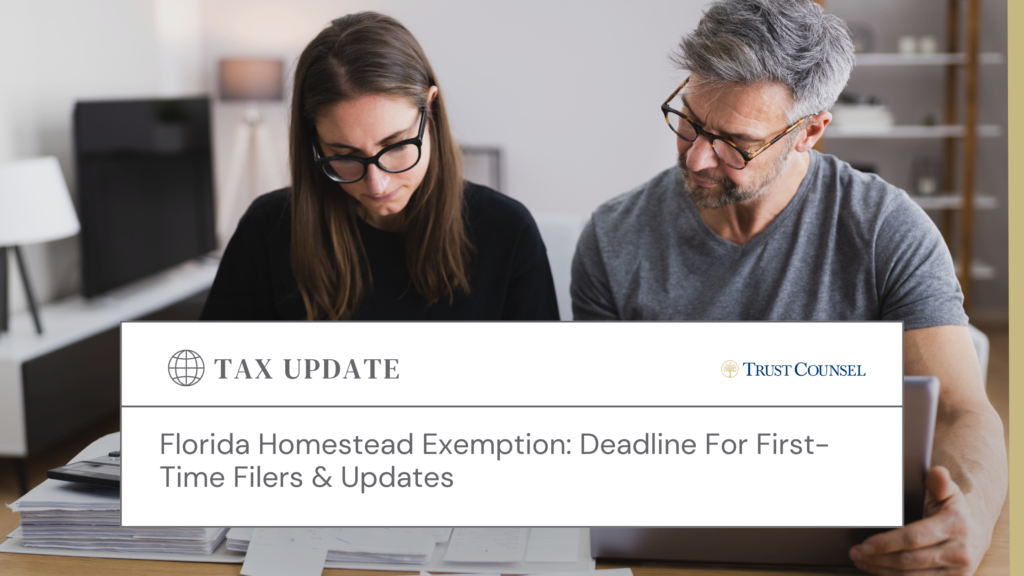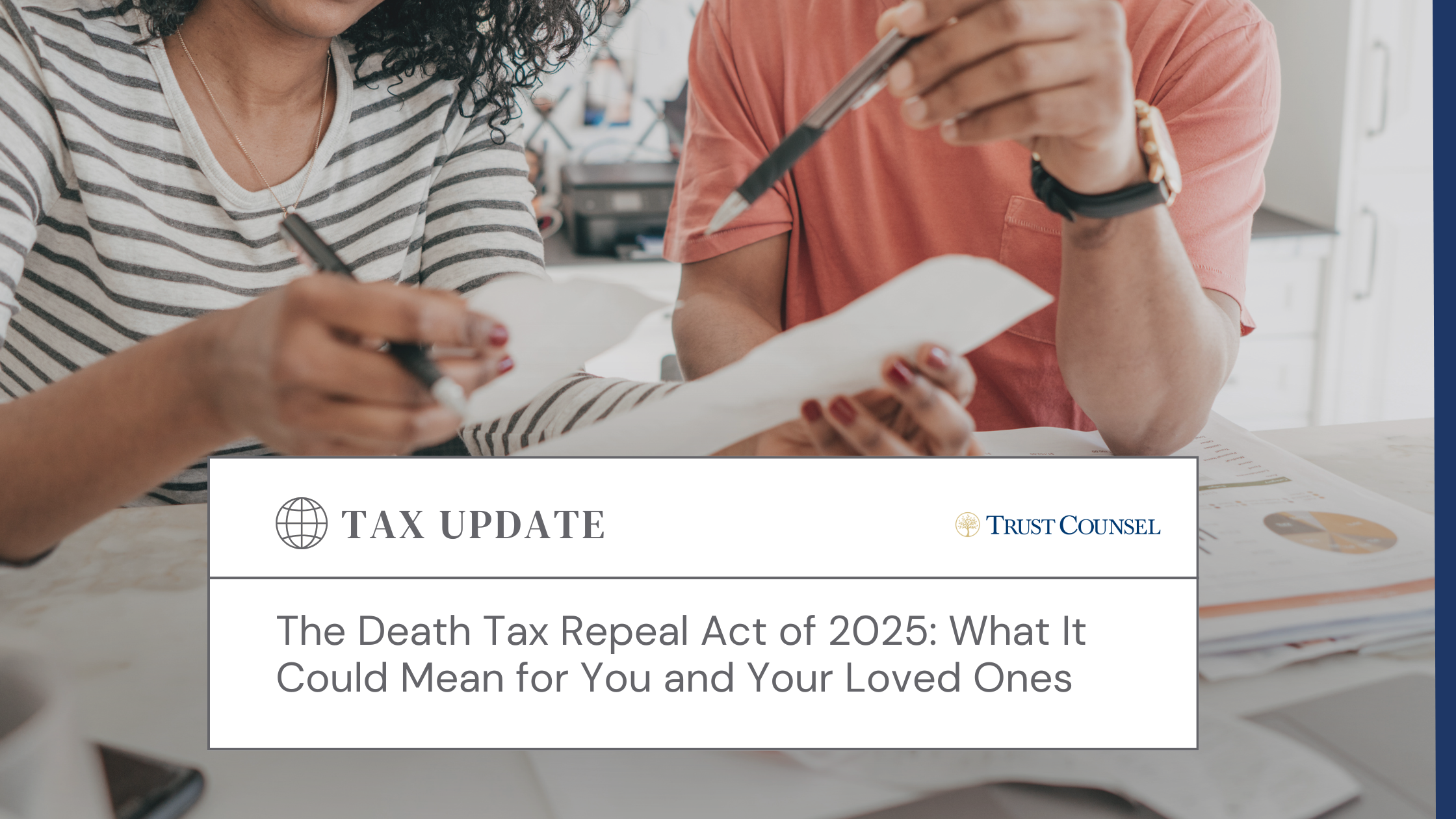One of the biggest benefits of living in Florida is the Homestead Exemption, which reduces the taxable value of your primary residence. Recent legislative changes have enhanced the Homestead Exemption, further bringing down yearly property taxes for Florida homeowners.
What is the Homestead Exemption?
The Florida homestead exemption deducts a certain amount of assessed value from your primary residence, thereby reducing the property tax you owe on your home. The basic exemption can be up to $50,000. To be eligible for this year’s exemption, you must have been the owner of the property on January 1; the property must be your permanent residence; and you must be a permanent resident of the State of Florida.
Also, as a result of the Save Our Homes Act of 1992, your annual property tax assessment may increase no more than 3% over the prior assessment. Under Amendment 5, Florida’s homestead exemption will now take inflation into consideration for that exemption that applies to non-school taxes. Starting in 2025, the homestead exemption cannot rise more than 3% or the annual consumer price index (whichever is lower).
This assumes no change in ownership of the property. Note that the assessed value for tax purposes is not the same as the market value of your home.
Deadline to File the Homestead Exemption
First-time application for the Florida homestead exemption is due March 3, 2025. (The customary deadline is March 1, but because March 1 falls on Saturday this year, the deadline has been extended to Monday, March 3.)
If you already have the homestead exemption and there have been no changes in ownership of your home, it is automatically renewed. You should have already received a tax exemption renewal card from your local property appraiser confirming this.
You May Qualify For Additional Florida Homestead Exemptions
Many of our clients may be eligible for additional exemptions beyond the basic $50,000 exemption. You may be eligible for additional exemptions if you are:
- • Age 65 or over with limited income.
- • Totally and permanently disabled.
- • A first responder employed by a Florida agency, who has been disabled as a result of his/her work.
- • A disabled veteran age 65 and older with a service-connected disability.
- • A widow/widower whose spouse died prior to January 1, 2025, and who has not remarried.
- • Have a “granny flat” – i.e., have added living quarters to homestead property in which parents or grandparents reside.
To learn more about these exemptions, eligibility requirements, how to apply, and what forms are needed, check with your county’s property appraiser. Click here for the location and contact information of the property appraiser in your county.
Documents You Need to File for the Homestead Exemption in Florida
To file for the Homestead Exemption, you must provide a few key documents to verify your eligibility. Each county in Florida may have specific additional requirements or slight variations, so it’s a good idea to check with your local county property appraiser’s office.
Here’s a list of what you generally need:
- • Proof of Ownership. You must be the owner or co-owner of the property you’re filing for. A deed to the property (or closing statement if recently purchased) can prove ownership.
- • Proof of Residency. One of the following can prove your residency: a Florida Driver’s License, a Florida ID Card with your current address, a Voter Registration Card showing your Florida address, or Vehicle Registration in your name with your Florida address.
- • Tax Identification. You’ll need to provide your Social Security Number or Individual Taxpayer Identification Number (IITN), if applicable.
- • Proof of U.S. Citizenship or Legal Residency. If you’re not a U.S. citizen, you may need to provide proof of legal residency status (e.g., permanent resident card, visa).
- • Trust Document. If you’re applying for homestead exemption for a property held in trust, you’ll need to submit a copy of the entire trust instrument with your application.
- • Proof of Income and Age (if applicable). If applying for senior exemptions, you’ll need proof of age (e.g., birth certificate, driver’s license).
- • Additional Documents (if applicable). You’ll need your marriage certificate if applying jointly with a spouse, income documentation for any special exemptions (such as those for disabled persons or veterans, etc.
- • Application Form. Complete the Homestead Exemption Application Form provided by your county’s property appraiser office.
Cap Can Be Transferred To New Primary Residence – “Portability”
If you have moved and had a homestead exemption on your prior property, you may be able to transfer your Save Our Homes exemption to your new property. This is called “portability”.
The homestead exemption does NOT automatically transfer to your new home. You must apply for a new homestead exemption by filing Form DR501. At the same time, you can apply to have the Save Our Homes tax benefit transferred to your new residence by filing a “Transfer of Homestead Assessment Difference” form.
Pro Tip: Are you moving? If you had a homestead exemption on another property in Florida within the last three years, you may be able to bring your Portability amount from your previous property to a new home. However, you must apply for it using form DR-501T and submit it with your new homestead exemption application. To request portability you must file an application, also due by March 3. (Note: this is different from the portability of the estate tax exemption from one spouse to a surviving spouse, a concept we have discussed in other blog posts.)
You have until January 1 of the third year after giving up your prior homestead exemption to request the new exemption and claim exemption portability. The tax benefit that may be ported over to your new home is capped at $500,000.
Examples of Portability
To illustrate how portability works, let’s say your former home’s market value is $400,000. With your homestead exemption, the assessed value is $300,000. The Save Our Homes Tax Benefit is therefore $100,000 ($400,000 – $300,000).
If you upsize:
New Home Market Value: $650,000
Save Our Homes Benefit Transferred From Former Home to New Home: $100,000
New Home Assessed Value: $550,000
If you downsize:
New Home Market Value: $300,000
When you purchase a less expensive home, only a percentage of the Save Our Homes Benefit may be ported over to the new property. The formula used to calculate the percentage is:
Subtract assessed value from market value of former property: $400,000 – $300,000 =$100,000
Divide by former property’s market value: $100,00/$400,000 = .25
Multiply by new property’s market value: .25 x $300,000 = $75,000
Deduct from market value of new property to determine assessed value of new home: $300,000 – $75,000 = $225,000
As always, if you, a friend, or family member need help with this or establishing or updating an estate plan, please reach out to our Client Services Department at Hello@ or call us at 305-707-7126 we are here to help!






